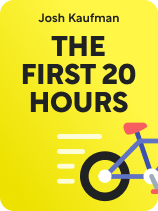

This article is an excerpt from the Shortform book guide to "The First 20 Hours" by Josh Kaufman. Shortform has the world's best summaries and analyses of books you should be reading.
Like this article? Sign up for a free trial here.
If you want to learn a new skill, how can you make it easier for yourself? Should you aim for proficiency or mastery?
Josh Kaufman says you can gain competency in a skill with just 20 hours of practice. But, you must make the road as smooth as possible first. Before you start practicing a new skill, he recommends that you think ahead and prepare for potential obstacles that might affect the quality of your practice.
Let’s look at a few common obstacles to learning a new skill and how to avoid them.
Obstacle #1: Emotion
According to Kaufman, the biggest obstacle to learning new skills is emotion, not intellectual or physical capabilities. Learning a new skill is uncomfortable because it requires you to struggle and feel inadequate at first. You start off with many doubts and frustrations when all you want is for the skill to feel easy and fun.
To overcome this obstacle, focus on competence, not mastery. If you immediately want to be outstanding at something, you’ll get frustrated and discouraged.
(Shortform note: It can be hard to overcome frustration and doubt when learning a new skill. However, in The Defining Decade, Meg Jay argues that struggle, and even failure, aren’t just obstacles to surmount—they’re the sources of real confidence. She explains that when you learn skills easily, you develop a fragile confidence that will crumble under pressure. But when you become competent at a skill after facing hardship and setbacks, you build a strong sense of confidence in yourself and your abilities.)
Obstacle #2: Too Much Effort to Start Practicing
Another common obstacle to learning a skill is mustering the will to start practicing. Kaufman writes that your willpower is limited, and, the more effort it takes to start practicing, the more likely you are to procrastinate or avoid doing it altogether.
Because of this, he recommends you make it as easy and convenient as possible to start practicing your skill. For example, if your skill involves a lot of equipment that takes time to set up, you might clear out a dedicated space for it so you don’t have to set it up and take it down every time.
(Shortform note: In The Happiness Advantage, Shawn Achor suggests you reduce the time it takes to start a behavior to 20 seconds or less. This is because when your willpower gets depleted, you’re more likely to avoid hard tasks and fall into easy and comfortable habits. Because of this, Achor recommends you also make it harder to do bad habits, by increasing the time it takes to assemble all the needed materials to at least 20 seconds. For example, if you want to practice your new skill but tend to get distracted by video games, you could disconnect the console from your TV and store it in another room.)
Obstacle #3: Distractions
External distractions, like noisy roommates or phone notifications, can also get in the way of you practicing your skill.
To avoid these, Kaufman suggests you preemptively clear your surroundings of distractions in preparation for your practice. For example, you might practice before others are awake or clear away electronics from your desk.
(Shortform note: In Indistractable, Nir Eyal says the root of distraction actually comes from inside you. He explains that when you experience discomfort (such as the frustration of learning a new skill), you instinctively look for ways to escape. To prevent this, you must understand and control your internal triggers: First, recognize which unpleasant feeling drove you to find a distraction. Second, record your distractions by noting the time, place, task, feelings you experienced, and details of the distraction. Finally, when you’re tempted by a distraction, tell yourself to wait 10 minutes. By then, you’ll likely have refocused and forgotten about it.)

———End of Preview———
Like what you just read? Read the rest of the world's best book summary and analysis of Josh Kaufman's "The First 20 Hours" at Shortform.
Here's what you'll find in our full The First 20 Hours summary:
- A simple and effective method for learning almost any skill in 20 hours
- The misconceptions that hold us back from learning new skills
- Actionable tips to help you optimize your skill-building experience






